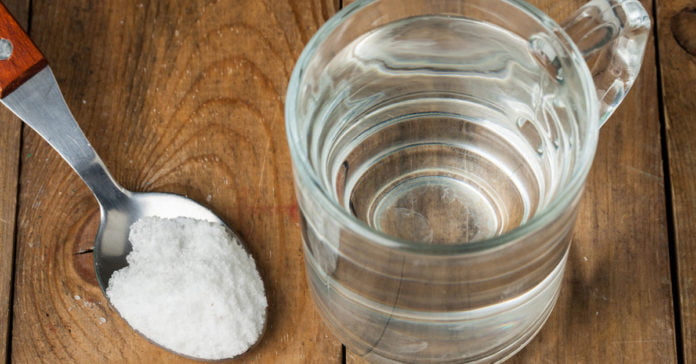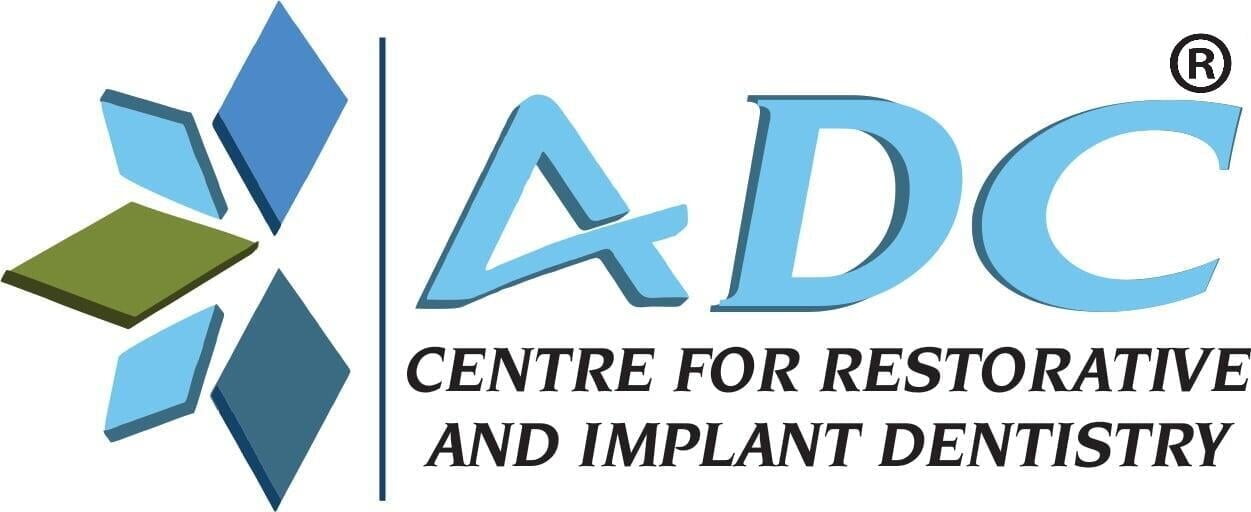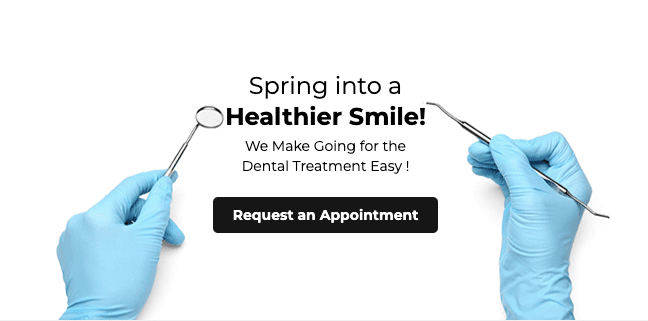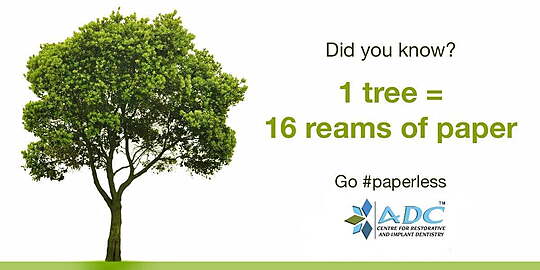Salt Water rinses are easy and time-tested home remedy for the dental infections and faster healing. To understand how the salt water rinses works, one has to understand the biologic phenomena of osmosis. In Osmosis the water and solvent ions moves from an area of higher concentration to an area of lower concentration to maintain the balance and the equilibrium.
Virus and bacteria accumulate in the oral cavity during infections. Sodium ions from the salt water move into the area of less concentration in oral cavity, usually inhabited by bacteria or viruses. This creates an environment that is not conducive for the bacteria or viruses as this causes the water to move out of the membrane causing the dehydration of the bacteria and viruses. Eventually this helps in relieving Dental pain or dental infections.
You can maintain the health of your teeth, gums, and tongue by maintaining an efficient at-home oral hygiene practice by using warm saline rinses. A saltwater rinse can help treat sore throats, gingivitis, and halitosis (the disease that causes bad breath). Additionally, this straightforward (and affordable) at-home solution can potentially hasten your mouth's recovery after surgery or a minor injury like a cut.
The salt water rinses aids in easing gum irritation and inflammation that may be present. Warm salt water rinses are also advised for individuals who have undergone extensive restorative dental work or inflamed gum tissue.
How do Rinses with Saline Water work?
Saltwater rinses are excellent because of their anti-bacterial and healing characteristics. The presence of salt momentarily raises the mouth's pH level, making it alkaline. Bacteria struggle to survive in this environment since they prefer an acidic environment. Because salt is an isotonic solution with an identical concentration of the minerals and salts naturally contained in the body, it has therapeutic effects. As a result, unlike certain therapeutic mouthwashes, salt water rinses won't irritate the mucosal membranes.
How to prepare salt water rinses?
- Add half a spoon of common salt to your cup of lukewarm water (Approx 300 ml). Stir well. Please ensure the water is not too hot for the oral cavity.
- Gargle and rinse with the saltwater for about 30 seconds.
- Repeat the process until you finish the water in the cup.
- Gargle every 3 to 4 hours to relieve the dental pain and infections.

Advantages of saltwater rinses
The high alcohol concentration in some mouthwashes might irritate your mouth, especially your gums, according to the Oral Cancer Foundation. Saltwater rinses might be safer substitutes that keep your mouth clean and eliminate microorganisms. Rinses made with saltwater offer additional advantages besides halting bacterial growth. These include facilitating a safe recovery from dental procedures and lowering the quantity of plaque in your mouth.
Cleans the Oral cavity: Salt-water rinses remove the acidic environment in the oral cavity, which harbours the bacterial infections. It neutralizes the acidic environment and increases the pH of The Saliva. This role is anti-inflammatory and antibacterial in nature. Salt water rinses in addition to the removal of the acidic environment also aids in removal of tiny food particles stuck in the tooth, which can lead to the tooth decay.
Aids in better Respiratory Health: Saline water gargling and nasal irrigation can protect against the common cold, according to a 2019 assessment of the scientific literature. Similar to this, a small study from 2020 discovered that gargling with warm saline water can help shorten upper respiratory infections by an average of two and a half days. Researchers from the study hypothesised that it could offer a secure and efficient intervention for those diagnosed with COVID-19 after receiving the SARS-CoV-2 virus.
Assists in Healing : Using saltwater rinses after dental treatments like tooth extractions, dry socket and dental implant surgery by helping the body recuperate. The migration of gingival fibroblasts is accelerated by salt, and extracellular matrix components are produced in greater quantities. These processes control the activity of wound repair, aiding in the speedy recovery from dental procedures. The soft tissues in the mouth are not irritated by saltwater, and it does not burn or hurt the mouth.
Helps in fungal infections: Candidiasis is the most common fungal infection that starts growing in the mouth, tongue, oesophagus and upper respiratory tract characterised by white patches and cottony growth leading to pain and burning sensation. Salt-water rinses not only help in relieving the pain but also help in fighting candida infection.
Relieves mouth ulcers: Mouth ulcers can be bothersome as they can cause pain or discomfort in the oral cavity. They are usually sensitive and painful in nature. Ulcers can occur due to various reasons such as accidental biting, hormonal changes, stress, sensitivity to the food or occasional allergy. Salt-water rinses relieves the pain and helps in faster healing of mouth ulcers.
Sore throat: Salt-water princes and goggle works as best natural remedy to relieve the pain and discomfort in the throat.
Help in cough: Salt-water rinses and gargles work as antitussive. It prevents the Cough and even works in cases of dry cough.
Relieves nasal congestion: Salt-water rinses and gargle prevents the thickening of the mucus in the upper respiratory tract and nose. It is also antibacterial in case of sore throat infections and reduces inflammation. Studies have well demonstrated that salt-water rinses and gargles reduce the chances of upper respiratory tract infections by almost 40%.
Dental plaque and gingivitis: Dental plaque is thin biofilm containing bacteria that accumulates on the surface of the tooth and gums. It is this biofilm, which hardens over a period of time to tartar called calculus leading to gingivitis and periodontitis. Salt water rinses aid in the removal of dental plaque and gingivitis
Heals Bleeding and swollen gums: Bleeding gums is the first sign of presence of bacterial infection. Rinsing with salt water is antibacterial and anti inflammatory in nature. Additionally salt-water rinses provide therapeutic effect in the cases with abscess.
Note: Too much of gargling with salt water can often lead to dehydration of the oral cavity and mucosa. Avoid swallowing the salt water as intake of too much of salt and salt water can lead to cardiovascular problems.
When can Warm Saline rinses be used?
Saltwater rinses provide a variety of advantages, but depending on their intended usage, they should be utilized differently.
- Following tooth extraction and Dental Implant Surgery: After 24-48 hours of dental extraction dental implant surgery you can start using warm saline rinses. Gently swish the rinses to avoid damaging the blood clot (s). After meals, you can perform them multiple times a day to keep your mouth clean. This will eliminate the bacteria from the painful area, stopping the infection from spreading. The warm saline rinses works remarkably well in relieving the pain from Dry Socket.
- Chronic gum disease: People who have periodontal disease may find saltwater rinses helpful. By mixing a teaspoon of salt with a glass of warm water, you may make your own mouthwash. Rinse your mouth with the resulting concoction.
- Toothache: Until you can see the dentist, the saltwater will help in temporarily relieving the agony from a toothache.
- Throat Discomfort: Repeatedly gargle with salt water for 15 to 30 seconds before spitting it out. Both a sore throat and bacteria will be washed away.
- Sores on the tongue: Canker sores may sting when you use saltwater rinses, but they still work well. Rinse with warm seawater after adding a teaspoon salt to a glass of water.
- Allergies: Although it won't eliminate allergies, saltwater can assist with some of their symptoms. Gargling with salt water might help relieve a sore throat.
Join the movement #paperless
Going Paperless can help save the Earth from climate change and biodiversity loss. It is a big task, but we know we can do it together. Get Help in going Paperless.
Medical Disclaimer:
The content of ADC-Centre for Restorative and Implant Dentistry's Blog/website is for information only, not advice or guarantee of any outcome. Information is gathered and shared from reputable sources; however, ADC-Centre for Restorative and Implant Dentistry is not responsible for errors or omissions in reporting or explanation. No individuals, including those under our active care, should use the information, resources or tools contained within to self-diagnosis or self-treat any health-related condition. ADC-Centre for Restorative and Implant Dentistry gives no assurance or warranty regarding the accuracy, timeliness or applicability or the content.
ADC-Centre for Restorative and Implant Dentistry accepts no liability for errors, inaccuracies, omission, or misleading statements. ADC-Centre for Restorative and Implant Dentistry excludes liability for any losses, demands, claims or damages of any kind regarding information, content, or services at this blog/website. The information may be updated at any time, especially as medical/dental discoveries and research evolves regarding the dentistry and its conditions. At no time does ADC-Centre for Restorative and Implant Dentistry take any responsibility for any action taken or care chosen in reliance on information contained in this blog or this website.
















